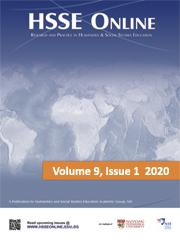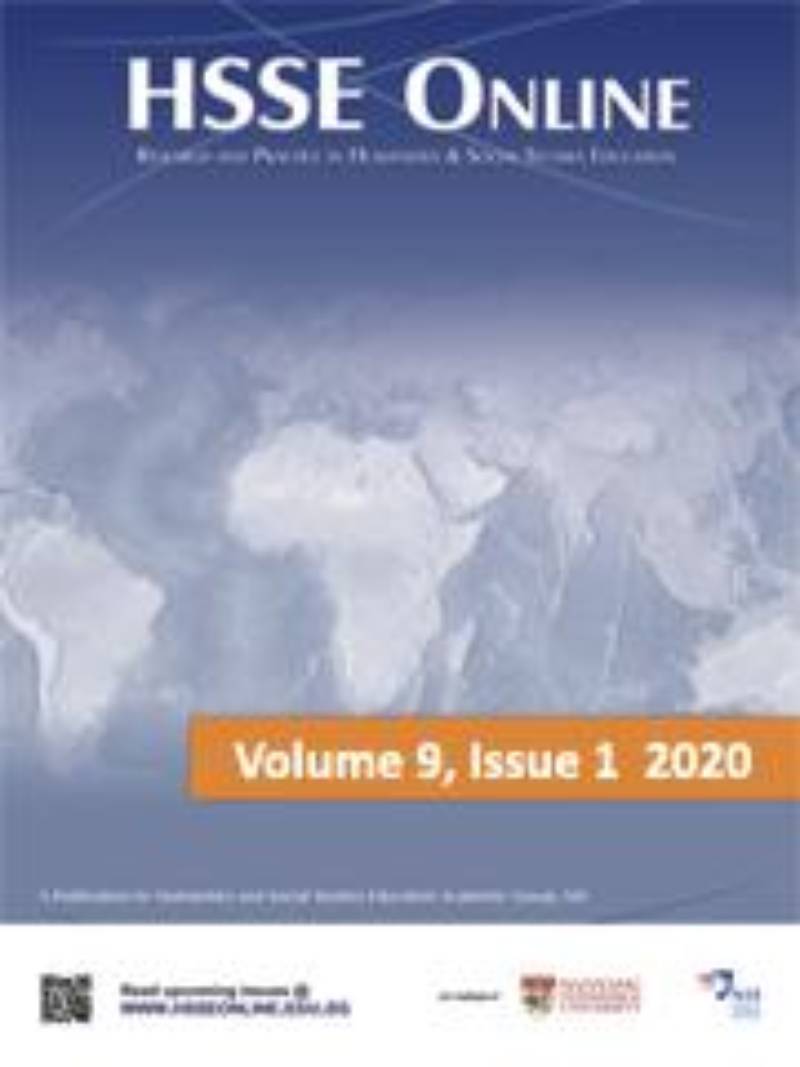HSSE Online is published by the HSSE Academic Group, National Institute of Education (NIE), Singapore. The overarching purpose of the journal is to energize, inform and improve teaching practice in Humanities and Social Studies education in Singapore and to provide a venue to share ideas, research and resources that will be useful to teachers and scholars.
We seek to develop and deepen knowledge and understanding of powerful and innovative research and practice in Humanities and Social Studies education. We hope you will make use of these ideas and resources as well as contribute your own.

Featured Articles
Negotiating a sense of home: mainland Chinese student migrants’ childhood education migration experiences in Singapore
XinTong CHEN Keywords children’s migration international student mobility home belonging national identity Abstract As part of the rise in international student mobility, more children are venturing abroad for pre-tertiary education. These children are often embedded in the transnational social field, forging deep and ongoing familial, social-economic, and political connections across borders. Yet, to date, […]
Keywords
children’s migration
international student mobility
home
belonging
national identity
Abstract
As part of the rise in international student mobility, more children are venturing abroad for pre-tertiary education. These children are often embedded in the transnational social field, forging deep and ongoing familial, social-economic, and political connections across borders. Yet, to date, there have been limited explorations of young student migrants’ experiences of home during their educational sojourn. In this context, this paper draws on in-depth interviews and photo elicitation with 18 mainland Chinese student migrants who migrated to Singapore during childhood to explore how construction of home intertwines with educational mobility. I argue that student migrants’ complex transnational network has reshaped the geographies of their home, making it increasingly mobile and pluri-local. Their home is also associated with a set of meaningful relationships. However, this does not imply that they can produce a sense of home anywhere and everywhere. Emphasising the continuing salience of the physical qualities of a place in shaping one’s sense of home, I explore how student migrants’ home is simultaneously mobile, relational, and rooted materially.
Immigrant Parents’ Articulation and Imaginings of the Singaporean Education System
Ariel Kit Yen CHUA Lee Tat CHOW Peidong YANG Keywords immigration immigrant parent parenting education Singapore international school bilingualism Abstract Drawing on a study into immigrant parents’ influences on children’s education in Singapore, this paper presents preliminary and partial findings on immigrant parents’ discourses surrounding various forms of schooling or education systems, specifically the […]
Ariel Kit Yen CHUA
Lee Tat CHOW
Peidong YANG
Keywords
immigration
immigrant parent
parenting
education
Singapore
international school
bilingualism
Abstract
Drawing on a study into immigrant parents’ influences on children’s education in Singapore, this paper presents preliminary and partial findings on immigrant parents’ discourses surrounding various forms of schooling or education systems, specifically the local mainstream schools, international schools, education in their countries of origin, and shadow education in Singapore. The paper demonstrates how such discourses inform and are intertwined with the immigrant parents’ articulations of their parenting ideologies and educational philosophies. It is found that immigrant parents generally hold positive views on mainstream schools in Singapore, sometimes comparing these favourably with the perceived education and culture in international schools, as well as that of their countries of origin. At the same time, immigrant parents also pointed out the drawbacks of the Singapore education system in terms of its stressful nature, which has given rise to a pervasive shadow education sector. Through talking about and reflecting on these different forms of schooling/education, immigrant parents construct their notions of a good education. However, the paper cautions that the various characteristics attributed to different types of schools/education should be understood as immigrant parents’ subjective and imaginary constructs, reflecting not so much ‘objective reality’ as their ideologies and expectations pertaining to their children’s education.
Cultural Heritage and Identity Formation: A Study of Second-Generation Immigrant Children through Parental Perspectives in Singapore
Yi Fei LOH Lee Tat CHOW Peidong YANG Keywords identity immigrant education ethnic cultures Abstract This paper explores how immigrant parents influence the development of their children’s identities in Singapore, drawing on qualitative interviews with parents from diverse backgrounds. A key focus is the balance between maintaining ethnic traditions and integrating into Singapore society, […]
Yi Fei LOH
Lee Tat CHOW
Peidong YANG
Keywords
identity
immigrant
education
ethnic cultures
Abstract
This paper explores how immigrant parents influence the development of their children’s identities in Singapore, drawing on qualitative interviews with parents from diverse backgrounds. A key focus is the balance between maintaining ethnic traditions and integrating into Singapore society, along with parents’ aspirations for their children’s national identity. It is found that immigrant parents play an active role in transmitting heritage cultural values and practices to their children, with a focus on maintaining a connection to their heritage while also promoting societal integration into the host country. This approach is particularly reflected in the parents’ discourse about their children’s linguistic maintenance and adaptation. This research adds more broadly to the understanding of the immigrant experience and its implications for social cohesion and multiculturalism in Singapore.
Navigating Singapore’s Education System as an Immigrant Parent
Tammy ENG Jing Rou Lee Tat CHOW Peidong YANG Keywords immigrant parent immigrant children education Abstract This paper examines the challenges faced by immigrant parents in navigating and shaping their children’s education in Singapore. It explores how the parents’ migrant backgrounds influence their actions, reactions, and coping strategies within the Singaporean education system, identifying […]
Tammy ENG Jing Rou
Lee Tat CHOW
Peidong YANG
Keywords
immigrant parent
immigrant children
education
Abstract
This paper examines the challenges faced by immigrant parents in navigating and shaping their children’s education in Singapore. It explores how the parents’ migrant backgrounds influence their actions, reactions, and coping strategies within the Singaporean education system, identifying patterns of behaviour specific to this group. The study reveals several challenges unique to immigrant parents, such as a lack of information about the local education system, disadvantages in the school admission process, and difficulties in providing adequate academic support to their children. Besides these challenges, the paper also highlights the resourcefulness of immigrant parents and the strategies they employ to navigate and mitigate these difficulties within an unfamiliar social and educational environment. By shedding light on the experiences of immigrant parents, this paper contributes to a deeper understanding of the diverse ways in which families adapt to and engage with the educational landscape in Singapore.
Immigrant Parents and Mother Tongue Language Education in Singapore’s Bilingual System
Britney Qi Wen ONG Lee Tat CHOW Peidong YANG Keywords immigrant parents Mother Tongue Language (MTL) education Bilingualism, Singapore Abstract Bilingualism has been the cornerstone of Singapore’s language policy since 1959 (Lee & Phua, 2020). Given Singapore’s diverse population, it is crucial to understand how immigrant parents from various cultural backgrounds perceive and engage […]
Britney Qi Wen ONG
Lee Tat CHOW
Peidong YANG
Keywords
immigrant parents
Mother Tongue Language (MTL) education
Bilingualism, Singapore
Abstract
Bilingualism has been the cornerstone of Singapore’s language policy since 1959 (Lee & Phua, 2020). Given Singapore’s diverse population, it is crucial to understand how immigrant parents from various cultural backgrounds perceive and engage with the country’s bilingual education system. This paper investigates the perceptions and involvement of immigrant parents in the Mother Tongue Language (MTL) component of Singapore’s bilingual education framework. The study focuses on two groups: Chinese immigrants from mainland China and non-Chinese immigrants from countries such as India and the Philippines. The research highlights immigrant parents’ positive views on bilingual education framework as a benefit of migrating to Singapore for their children’s education. Parents consider factors like future career prospects, cultural preservation, social integration, and reducing academic pressure when selecting their children’s MTL. While some face challenges in navigating their children’s MTL learning, others find their children adapt well. Nevertheless, all parents actively engage in efforts to enhance their children’s MTL proficiency, whether by enrolling them in tuition classes, incorporating language-focused activities at home, or through other supportive measures.
Search
News & Announcements
The Practice of Economics Teaching at Junior College Level
Learning of and Learning for Urban Liveability
Controversial History Education in Asian Contexts – A Discussion
Quick Index
- HSSEOnline Vol.9, 2020
- HSSEOnline Vol.8, 2019
- HSSEOnline Vol.7, 2019
- HSSEOnline Vol.6, 2019
- HSSEOnline Vol.5, 2019
- HSSEOnline Vol.4, 2019
- HSSEOnline Vol.3, 2019
- HSSEOnline Vol.2, 2019
- HSSEOnline Vol.1, 2019


